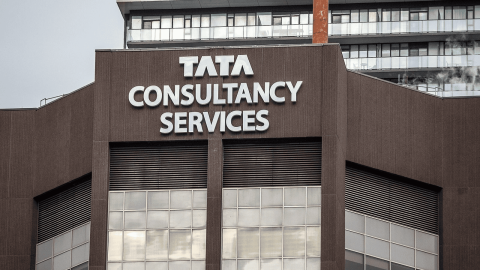Tata Consultancy Services (TCS) Share Price in Focus; Prabhudas Lilladher Suggests BUY Ratings
Prabhudas Lilladher has reiterated its BUY rating for Tata Consultancy Services (TCS), setting a target price of Rs 4,920, with an expectation of revenue growth despite challenges in certain sectors. TCS continues to face a complex market landscape, balancing between margin pressures and growth ambitions. A key contributor to its performance in the upcoming quarters will be the ongoing BSNL deal and gradual recovery in the BFSI (Banking, Financial Services, and Insurance) sector. However, TCS faces margin pressure due to rising subcontractor costs and volatile performance in other sectors.
Current Performance and Revenue Growth Challenges
TCS reported revenue of USD 7.7 billion, up 1.1% quarter-over-quarter (QoQ) in constant currency (CC) terms. However, this figure was below both Prabhudas Lilladher's (PL) estimate of 1.5% and the consensus estimate of 1.3%. In dollar terms, the revenue grew by 2.2% QoQ. The growth was driven largely by the regional markets, with notable contributions from the BSNL deal, which accounted for approximately 150 basis points (bps) of the overall growth. Despite this, volatility in other sectors dampened consolidated growth, particularly in consumer-facing and asset-heavy verticals.
Sectoral Performance: A Mixed Bag
The BFSI vertical showed encouraging recovery with 1.9% QoQ growth, bolstered by performance improvements in North America and the UK. However, other sectors experienced volatility: the manufacturing sector fell by 0.1%, life sciences declined 3.4%, and communications dropped 2.7%. The BFSI recovery stands in contrast to the weak performance in other key verticals, which is partially attributed to macroeconomic headwinds and client-specific challenges, particularly within life sciences.
Pressure on Margins and Subcontracting Costs
TCS's EBIT margin fell by 60 bps to 24.1%, below PL's estimate of 25.2% and consensus of 24.9%. The margin decline is attributed to an increase in third-party expenses and subcontractor costs, which grew by 40 bps QoQ. Although the BSNL deal provided significant revenue growth, the higher associated costs placed downward pressure on margins. TCS is targeting an exit margin of 26% by Q4 FY25, but achieving this goal will require overcoming the ongoing cost challenges.
Key Deals and Regional Contributions
The BSNL deal continues to play a pivotal role in TCS's growth, contributing to the 13.1% QoQ expansion in regional markets. Other key geographies performed unevenly, with India leading growth at 21.3% QoQ, followed by the UK (up 2.8%) and Continental Europe (up 3.6%). On the other hand, North America and Latin America faced contractions of 1.7% and 3.2% respectively. This geographical performance underscores the challenges TCS faces in balancing regional strengths with weaknesses in core markets like North America.
Growth in Total Contract Value (TCV) and Deal Wins
TCV grew by 3.6% QoQ to USD 8.6 billion, indicating steady demand for TCS's services. BFSI, retail, and North America contributed significantly to the TCV, which remains at a healthy book-to-bill (BTB) ratio of 1.1x. Management remains confident that TCV will stay within the USD 7–9 billion range and that overall deal pipelines are robust. The company continues to see elongated deal closure times, but management anticipates that FY25 TCV could match FY24's figure of USD 42.7 billion.
Gen AI and Emerging Markets: Future Growth Engines
The company’s investment in Gen AI (Generative AI) is yielding positive results, with its pipeline of AI engagements more than doubling in Q2 FY25 to 600, compared to 278 in Q1. TCS has seen a significant uptick in proof-of-concept (POC) conversions, from 8 in Q1 to 86 in Q2. Although most Gen AI engagements are relatively small in size, a few large, multi-year projects are expected to drive future revenue growth.
In addition to Gen AI, TCS is expanding its footprint in emerging markets such as India, the Asia-Pacific (APAC) region, and Latin America (LATAM). Management views these regions as critical to long-term growth and expects operational scale-ups to gradually improve margins in these markets.
Macroeconomic Headwinds: Inflation and Discretionary Spending
TCS continues to face challenges related to global macroeconomic factors, such as high inflation and rising interest rates, which have impacted discretionary spending among clients. Although demand for cost optimization and vendor consolidation remains strong, management anticipates a gradual recovery in discretionary spending as inflationary pressures ease. The company also expects demand for legacy modernization and customer experience enhancements to accelerate in the coming quarters.
Financial Outlook: Revised Estimates and Valuation
Prabhudas Lilladher has revised its estimates for TCS’s financial performance. The brokerage has cut its revenue growth estimates for FY25E and FY26E by 10 and 40 bps, respectively, and now expects USD revenue growth of 6.4%/8.0%/9.4% for FY25E/FY26E/FY27E. Similarly, EBIT margin estimates have been reduced by 60 bps for FY25E and 30 bps for FY26E due to continued margin pressure from the BSNL deal and subcontractor costs.
In terms of valuation, TCS is trading at a price-to-earnings (P/E) ratio of 30.4x FY25E earnings, with an estimated target P/E of 28x for FY27E. The target price has been set at Rs 4,920, reflecting a potential upside from the current market price of Rs 4,227.
Conclusion: TCS Positioned for Long-Term Success Amid Short-Term Challenges
TCS remains well-positioned to capture demand for enterprise services, especially in areas like core business optimization and Gen AI services. While short-term challenges persist, particularly in margins and client spending in certain verticals, the company’s strong pipeline, key deal wins, and investments in emerging markets provide a foundation for long-term growth. Investors are advised to maintain a BUY position with a target price of Rs 4,920, anticipating a gradual recovery in margins and sustained growth in core and emerging sectors.
